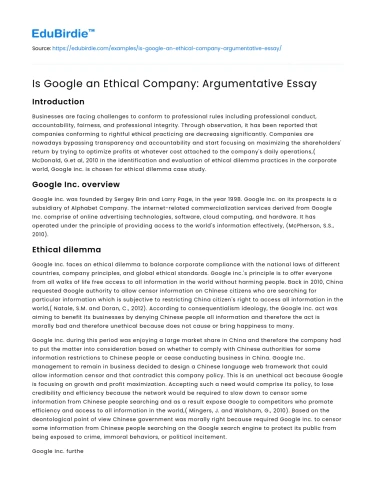Introduction
Businesses are facing challenges to conform to professional rules including professional conduct, accountability, fairness, and professional integrity. Through observation, it has been reported that companies conforming to rightful ethical practicing are decreasing significantly. Companies are nowadays bypassing transparency and accountability and start focusing on maximizing the shareholders' return by trying to optimize profits at whatever cost attached to the company's daily operations,( McDonald, G.et al, 2010 In the identification and evaluation of ethical dilemma practices in the corporate world, Google Inc. is chosen for ethical dilemma case study.
Google Inc. overview
Google Inc. was founded by Sergey Brin and Larry Page, in the year 1998. Google Inc. on its prospects is a subsidiary of Alphabet Company. The internet-related commercialization services derived from Google Inc. comprise of online advertising technologies, software, cloud computing, and hardware. It has operated under the principle of providing access to the world's information effectively, (McPherson, S.S., 2010).
Save your time!
We can take care of your essay
- Proper editing and formatting
- Free revision, title page, and bibliography
- Flexible prices and money-back guarantee
Ethical dilemma
Google Inc. faces an ethical dilemma to balance corporate compliance with the national laws of different countries, company principles, and global ethical standards. Google Inc.'s principle is to offer everyone from all walks of life free access to all information in the world without harming people. Back in 2010, China requested Google authority to allow censor information on Chinese citizens who are searching for particular information which is subjective to restricting China citizen's right to access all information in the world,( Natale, S.M. and Doran, C., 2012). According to consequentialism ideology, the Google Inc. act was aiming to benefit its businesses by denying Chinese people all information and therefore the act is morally bad and therefore unethical because does not cause or bring happiness to many.
Google Inc. during this period was enjoying a large market share in China and therefore the company had to put the matter into consideration based on whether to comply with Chinese authorities for some information restrictions to Chinese people or cease conducting business in China. Google Inc. management to remain in business decided to design a Chinese language web framework that could allow information censor and that contradict this company policy. This is an unethical act because Google is focusing on growth and profit maximization. Accepting such a need would comprise its policy, to lose credibility and efficiency because the network would be required to slow down to censor some information from Chinese people searching and as a result expose Google to competitors who promote efficiency and access to all information in the world,( Mingers, J. and Walsham, G., 2010). Based on the deontological point of view Chinese government was morally right because required Google Inc. to censor some information from Chinese people searching on the Google search engine to protect its public from being exposed to crime, immoral behaviors, or political incitement.
Google Inc. furthermore allows organizations to track people's information, and location without their consent is unethical though not illegal. Google Inc. signs contracts with users to protect individual information but allowing companies and other government authorities to access personal information is a one-way Google company is deceiving its users that contract its principle do no evil. As a result, users lose trust in Google services, and loyalty and sing out to Google services which results in Google income continuing to lose to competitors like Bingdong.com in the name of searching for the attainment of competitive advantages in the internet-providing industry.
Stakeholders impacted by the ethical issue.
Restraining to comply with Chinese authorities on information censor to China individuals, Google shareholder's profit declined largely. Google through store records helps to improve corporate efficiency in which cookies are deleted and leave those photos online which are violating people's privacy as other online users use those photos hence Google faces many charges,( Klassen, K.J. and Laplante, S.K., 2012). Also, Google in the year 2011 was under IRS audit due to federal income taxes avoidance through shifting profit into its offshore subsidiaries which are denying the United States government revenue collection as a result of lack of accounting transparency and integrity.
The ethical decision was undertaken by Google Inc.
When Good refused to comply with information censor from Chinese government directives and moved its operations to Thailand the shareholders lost Chinese customers but guided its principles and policies to protect its reputation from worsening across the globe and competitors taking that as an advantage to outsell its Google services. Google's refusal to avail its data to the United States authority on individuals faces lawsuits which are attached extra costs. Compliance with IRS financial reporting standards overburdens by compiling Google to hire extra internal financial reporting control structures to ensure international ethical standards have been adherence to, (Tan, J. and Tan, A.E., 2012).
Conclusion
This discussion can conclude that many corporates across the globe are facing challenges to conform to ethical practices and at the same time optimize profit maximization. Shareholders want their managers to focus on activities that attract profits regardless of the method applied to arrive at making desirable financial performance hence considering ethical practices as an outdated issue in modern business operations.
In contrast to the above discussion, unethical practices seem to benefit a business for a short period but in the long run the business losses to competitors or companies that are put into consideration ethical practices in their business activities. For example, in businesses practicing ethical activities such as being mindful of employees' welfare, employees are motivated to work and hence maintain high individual productivity. Society tends to become loyal to an enterprise practicing ethical practices hence revenue increase and as a result, achieve business sustainability.






 Stuck on your essay?
Stuck on your essay?

